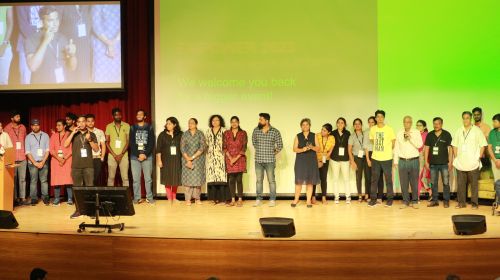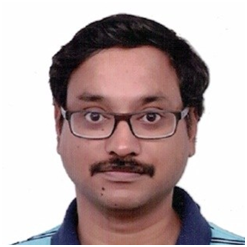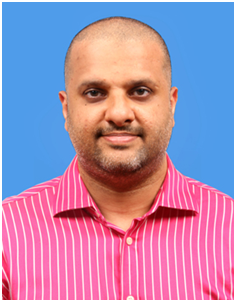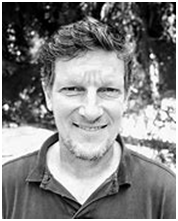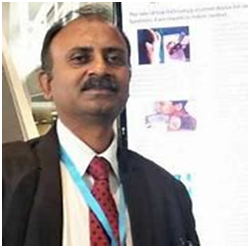Introducing Our Invited Speakers
Prof. Shovan Saha
MAHE, Manipal

Title: A journey to restore hand functions using indigenously developed frugal devices: Manipal model
Abstract
The human hand may well surpass all body parts except the brain as a topic of universalinterest. The hand has been characterized as a symbol of power, as an extension of intellect,and as the seat of will. The hand is the final link in the mechanical chain of levers that beginsat the shoulder. The hand itself is remarkably mobile and malleable. It is capable of a great variety of functions, from grasping objects of various shapes, and tactile exploration toemphasizing an idea being expressed.
Due to rapid industrialization and motorization in India, there is ever ever-increasing incidences of injuries involving the hand, which can be musculoskeletal and neurological in nature. The hand function may also be compromised due to degenerative conditions, age related issues or birth defects. All these leads to major impact on individual’s work capacity, daily living tasks and leisure pursuits.
Adaptive devices often are a key intervention, but according to WHO, only 10% of potential beneficiaries have access to assistive products, owing to factors such as high costs and lack of financing, availability, accessibility, awareness, and trained professionals.
To minimize the negative impact of dysfunction, an accessible method is been practiced. The Manipal Model includes the process of conceptualizing, creating, crafting, and delivering these indigenously developed low-technology frugal devices in the form of splints (remedial in nature) and adaptive devices (enabling in nature), and facilitating them to meet the requirements of basic and instrumental activities of daily living, like eating, writing, driving, typing, and playing a musical instrument.
This current method involves facilitating individuals to express their needs and ensuring their preference for functional independence is kept paramount. The preferred activities are simulated and profiled to analyze the gaps. Based on these findings, designs are created to bridge the differences and ensure that devices optimally utilize the residual physical capabilities.
These low-technology frugal adaptations are simple mechanical devices, handcrafted and customized to meet the unique needs of every single dysfunctional hand and should resonate with the individual’s aspirations. These indigenous designs made out of local resource like low temperature plastic and aluminum, and adhering to the local context are its strength in terms of accessibility, affordability and relevance.
The designing of these devices comes with certain challenges as well, it takes into account some very fundamental aspects like movement restriction, weakness, lack of control, sensory issues, lack of motor control, part absence the hand, etc. Any form of technological solutions needs to accommodate all these variations including the distraught mind. The skill is to customize and deliver the device at a time when needed the most always remains a challenge.
Dr. Abhinandan
SRIHER

Title: Empowering Independence: A Personal Exploration of Assistive Technologies for Spinal Muscular Atrophy
Abstract
Spinal Muscular Atrophy (SMA) is a genetic disorder that affects the motor neurons in the spinal cord, leading to muscle weakness and loss of motor function. Assistive technologies can play a significant role in enhancing the quality of life and independence of individuals with SMA. The talk will highlight the transformative impact of these technologies, addressing their capacity to bridge gaps and foster independence. It will also touch upon identified gaps and challenges, emphasizing the importance of continued innovation and collaboration. Through personal anecdotes and insights, this talk aims to inspire a deeper understanding of the potential of assistive technologies in promoting inclusivity.
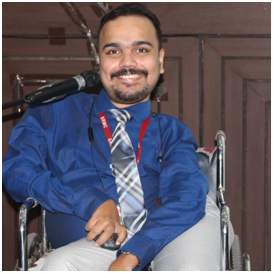
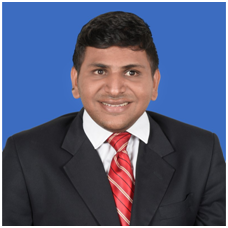
Azeesh Rahman
Person with visual impairment, Business Development Enabler, IIT Madras Alumni 2021

Title: Way to Independent living with Able Aura
Abstract
Access is a prime problem for persons with disabilities when it comes to procuring assistive aids or accessing services for their needs. It becomes even more difficult when there is no common platform for accessing these. The talk will focus more on the importance of independent living and how little things can help in their daily living.
Able Aura has all the assistive aids and services required for a person with disability on one platform, everything is available for persons with disabilities on their finger-tip through Able Aura platform
Supriya Dey
Vision Empower

Title: Unlocking the potential of accessible EdTech for inclusiveeducation. Case Studies: Subodha and Hexis-Antara
Abstract
There are an estimated 400 special schools for the blind across India which offer education in local languages. In the majority of these schools, children do not study Math & Science beyond grade 7.Those who do study these subjects till secondary exams have been deprived of accessible STEM education in higher studies. About 60% of the teachers are people with visual impairment who require accessible STEM content in local languages, training on pedagogical methods and support to teach STEM subjects. This talk will highlight the potential of unlocking two technology innovations from Vision Empower – Subodha and Hexis-Antara – which have been created to bridge this gap and provide accessible education to children with visual impairment.
Subodha is an accessible Learning Management System while Hexis-Antarais a composite solution to read content in Braille on demand in any Indian language.
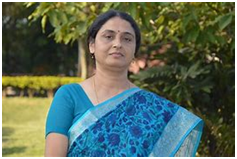
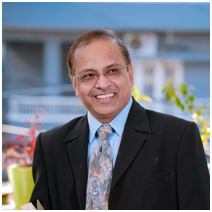
Abstract
Project Discovery has been capturing innovative solutions that emerge from necessity, for and by Persons with Disability. These solutions, often overlooked, are collected via videos, stored in an open repository, and shared for others to access. With millions of people with disabilities lacking crucial assistive solutions in India, Project Discovery strives to empower this community by providing a platform to share ideas and connect.
The initiative goes further with DISH (Disability Innovative Solutions Hub), which aggregates and spreads assistive solutions, breaking barriers for individuals with disabilities. Built on the ODIS (Open Disability Inclusion Stack) protocol, DISH has the potential to transform accessibility and inclusion through the search and discoverability of assistive solutions. ODIS is the foundation that different applications can use to include persons with disabilities seamlessly.
Abstract
Paul is a passionate and creative inventor with over a dozen granted technology patents to his name. His work spans fields that extend from mechanical horology, food processing machines, special purpose machines and assistive technologies. Paul will be addressing the audience about his shift from being a regular technology person to changing course and starting a company where the primary focus is to design and develop solutions to problems in the disability sector. He will talk about his experiences and with examples of some of his inventions, he will illustrate how one can stimulate and nurture creativity based on his understanding of the subject and will talk about some of the people and experiences that inspired him to continue this exciting journey. In the realm of working with PWD, Paul has designed a variety of Braille Display mechanisms, Refreshable Braille Display devices., a currency identifying template, a tactile Geometry teaching kit, tactile printing methodologies, a low-profile tactile Chess game to name a few.
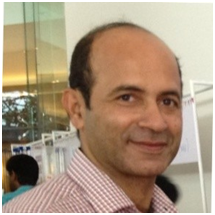
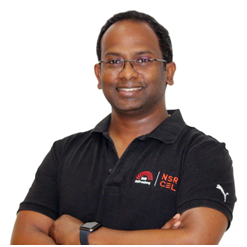
Arun Fernandez
DLearners

Title: Promoting Inclusivity for Children with Specific Learning Disabilities: The Role of Online Solutions
Abstract
In today’s rapidly evolving educational landscape, Mr. Arun Fernandez, the founder of DLearners, is spearheading a transformative initiative to address the pressing issue of Specific Learning Disabilities (SLD) that silently affect over 10% of school-going children worldwide. These disabilities, including Dyslexia, Dysgraphia, and Dyscalculia, often lead to profound academic challenges, stigmatization, discrimination, and emotional distress, particularly for children in semi-urban and rural areas of developing countries. Unlike their urban counterparts, many of these children lack access to screening for SLD, perpetuating a cycle of academic underperformance, dropouts, diminished self-esteem, and even juvenile delinquency.
The root of this problem lies in a profound lack of awareness about SLD and the unavailability of affordable and accessible remedial interventions. This talk will delve into the significance of inclusivity in education and how online solutions can be a potent catalyst for change in the lives of children with SLD.
DLearners’ mission is to promote inclusivity by bridging the gap in SLD support. The talk will explore the multifaceted advantages of online solutions, including:
1. Reduced Stigma: Online screening and intervention tools provide a confidential and non-judgmental environment for children to address their SLD, reducing the stigma associated with traditional diagnostic processes.
2. Accessibility: With DLearners’ online platform, children can access support from the comfort of their homes, eliminating geographical barriers that often hinder access to specialized educational resources.
3. Expert Guidance: Online solutions are facilitated by dedicated special educators who can provide personalized support to each child, helping them overcome their unique learning challenges.
4. Affordability: DLearners’ online interventions are cost-effective when compared to traditional offline centers, making them accessible to a wider range of families, including those in underserved communities.
By championing inclusivity through accessible online solutions, DLearners aims to break down the barriers that prevent countless children with SLD from realizing their full academic potential. This talk will highlight the urgency of addressing SLD-related challenges, shedding light on the transformative power of online resources in fostering a more equitable and inclusive educational landscape for all children, regardless of their learning differences.


